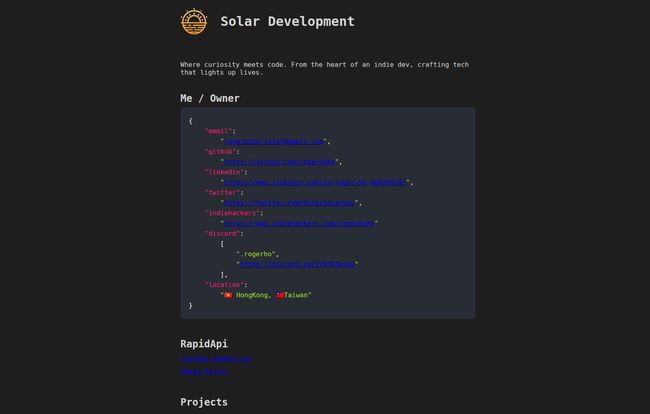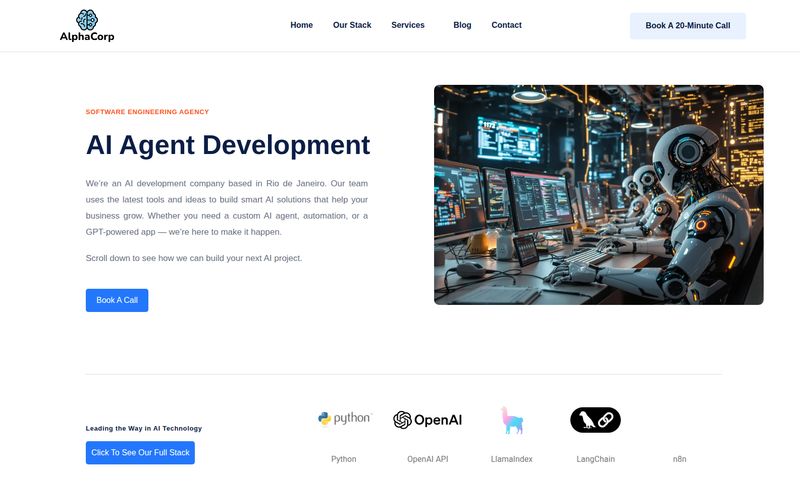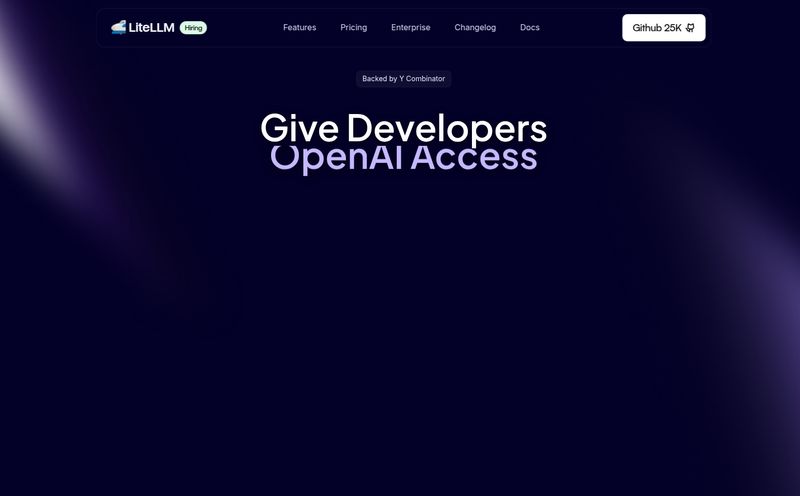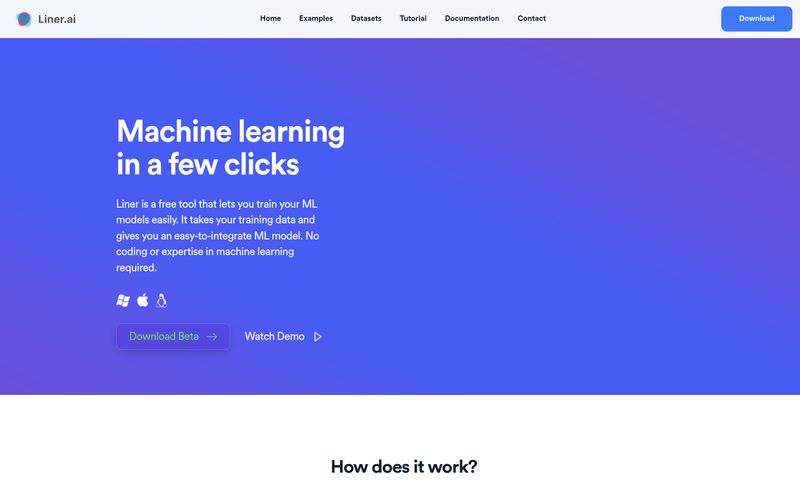I spend a weird amount of my time scrolling through places like Indie Hackers and GitHub. It's a bit of a habit. You wade through a lot of half-finished projects and ambitious-but-doomed-to-fail ideas, but every so often, you find a little gem. A project built not by a VC-funded team in Silicon Valley, but by one person with a good idea and the coding chops to bring it to life. That’s exactly how I felt when I stumbled upon Solar Development.
It’s not flashy. The website has this cool, dark-mode, code-editor aesthetic that speaks directly to my inner geek. The tagline says it all:
Where curiosity meets code. From the heart of an indie dev, crafting tech that lights up lives.
You just don't get that from a corporate behemoth. It feels personal, and I was immediately hooked.
So, What Exactly is Solar Development?
Think of it less as a big, formal platform and more as a digital curiosity shop run by a single creator. The site is the home base for Roger Ho, a developer based out of Hong Kong and Taiwan. Right on the homepage, he lays it all out: his email, his GitHub, LinkedIn, Twitter, even his Discord handle. I have to say, that level of transparency is incredibly refreshing. When was the last time you could find a direct line to the person who actually built the tool you're using?
At its core, Solar Development is a portfolio, but it's a portfolio with tools you can actually use. It's a testament to the indie developer spirit—building things because you can, because they solve a problem (even a small one), and because it's fun. It’s a stark contrast to the often impersonal world of SaaS.
The Main Attractions: The Tools
Alright, let's get to the good stuff. The reason I stuck around. The site currently showcases two main tools, both with some interesting applications for those of us in the content and SEO world.
The YouTube Summarizer: Your New Best Friend for Research
We’ve all been there. You find a 90-minute webinar or a long-form interview that looks promising for a new article you're researching. But who has 90 minutes to spare just to see if it contains that one golden nugget of information? The 'TL;DW' (Too Long; Didn't Watch) struggle is real, my friends.
This is where the YouTube Summarizer comes in. It does exactly what it says on the tin: you feed it a YouTube link, and it gives you a summary. For an SEO blogger like me, the use cases are immediately obvious:
- Competitor Research: Quickly get the gist of a competitor's long video guides or product reviews without sitting through the whole thing.
- Content Ideation: Summarize expert interviews or conference talks in your niche to pull out key themes and potential blog post ideas.
- Fast-Track Learning: Want to learn a new skill from a tutorial but dont have a lot of time? A summary can tell you if the video is worth your full attention.
I’ve found tools like this to be invaluable for my workflow. They act as a first-pass filter, saving me hours every single week. It's like having a research assistant who works for free. The fact that it's offered up as part of an indie project is just the cherry on top.

Visit Solar Development
The Image Parser: More Than Meets the Eye?
Now, this one is a bit more of a mystery, and I kinda like that. The site lists an "Image Parser," but doesn't go into a ton of detail on its full capabilities. And that's okay! It gets the mind whirring. As someone deep in SEO, my first thought goes straight to image optimization.
What could a tool like this do? I'm speculating here, but an image parser could potentially be used for things like:
- Optical Character Recognition (OCR): Extracting text from images, like presentation slides or infographics. Super useful for quoting sources.
- Object Detection: Identifying what's in an image to help auto-generate descriptive file names or even alt text. That's a huge potential time-saver for accessibility and image SEO.
- Color Palette Analysis: Maybe even pulling the dominant colors from a brand's logo or image for design work.
While the exact function isn't fully detailed, its presence shows a developer experimenting with computer vision. For me, that's exciting. It's a hint of what's possible and what might be coming next from Solar Development.
Beyond the Tools: The Developer and the Vibe
Here's something I really appreciate: looking through Roger's other projects gives you a sense of the person behind the code. He also built a "Kimchi Premium Tracker." For those not in the crypto space, the Kimchi Premium refers to the price difference for Bitcoin on South Korean exchanges compared to global ones. It's a super niche arbitrage tool.
Why does that matter in a review of his other tools? Because it shows breadth. It shows a curious mind tackling different kinds of problems, from NLP and video summarization to the wild west of crypto-finance. This isn't a one-trick pony. This is a developr who genuinely loves to build things. Supporting projects like this feels like investing in creativity and passion, not just a software license.
Let's Talk About Pricing
This section will be short and sweet. When you try to find a pricing page, you get a simple message: "Cannot GET /pricing".
And honestly? I love it. It tells me this isn't a project primarily driven by monetization. It’s likely free to use, perhaps with some rate limits, or available through the RapidAPI marketplace where you might pay pennies based on usage. For the average user, student, or fellow blogger, this basically means you have a free, powerful tool at your disposal. You can't really argue with that.
Who is Solar Development For?
This isn't a tool suite that's going to replace a massive enterprise-level software subscription. It's not trying to. I see Solar Development as the perfect companion for a specific set of people:
- Content Creators and SEOs: For quick research, idea generation, and workflow efficiency.
- Students: An amazing free resource for summarizing lectures or research videos.
- Other Developers: As an inspiration and a showcase of what one person can build.
- The Curious: Anyone who just needs to quickly summarize a video without signing up for a complicated service.
It’s a utility knife, not a whole workshop. And sometimes, a sharp, reliable utility knife is exactly what you need.
My Honest Take and A Few Caveats
Look, I'm a fan, but let's be realistic. This is an indie project. That comes with a few things to keep in mind. Support isn't going to be a 24/7 call center. It’s one guy, probably answering emails between coding sessions. Updates might be driven by his personal interest and available time, not a corporate roadmap.
Some might argue that the functionality is more basic than paid competitors. They'd probably be right. But that’s the trade-off. You're exchanging a monthly fee and a bloated feature set for something lean, direct, and born from a genuine passion for building. In my experience, that trade-off is often worth it.
Final Thoughts on This Indie Gem
In a world of slick, over-marketed software, Solar Development is a breath of fresh air. It’s a reminder of the web's early promise: a place where individuals can create and share useful things. The YouTube Summarizer is a genuinely handy tool for my day-to-day work, and the project's entire ethos—transparent, personal, and passion-driven—is something I can really get behind. It's a project to watch, and I, for one, am excited to see what Roger Ho builds next.
Frequently Asked Questions
- What is Solar Development?
- Solar Development is the personal website and project portfolio of indie developer Roger Ho. It showcases his skills and offers useful, free tools like a YouTube Summarizer and an Image Parser.
- How much does Solar Development cost?
- The tools appear to be free. There is no pricing page, suggesting it's a passion project rather than a commercial product. The tools may also be available on marketplaces like RapidAPI with potential usage-based fees.
- Who created Solar Development?
- It was created by Roger Ho, a developer from Hong Kong/Taiwan. All his professional links, like GitHub and LinkedIn, are available on the website.
- What can the YouTube Summarizer tool be used for?
- It's great for quickly understanding the main points of a long video without watching the entire thing. This is useful for students summarizing lectures, researchers reviewing content, or SEOs analyzing competitor videos.
- Is this a good tool for large businesses?
- While it's a powerful tool, it's best suited for individuals, students, or small teams. It's an indie project, so it may not have the dedicated support or scalability that a large enterprise would require.
- What other projects has the developer worked on?
- The site also mentions a "Kimchi Premium Tracker," a niche tool for tracking cryptocurrency price differences on South Korean exchanges, showcasing the developer's diverse skill set.
Reference and Sources
- Solar Development Official Website: (Note: The actual URL is not provided in the images, but this would be the link)
- Roger Ho's GitHub: https://github.com/rogerho-
- Roger Ho's LinkedIn: https://www.linkedin.com/in/roger-ho-4b688d70/
- Investopedia: What Is the Kimchi Premium?
- RapidAPI Marketplace: https://rapidapi.com/



